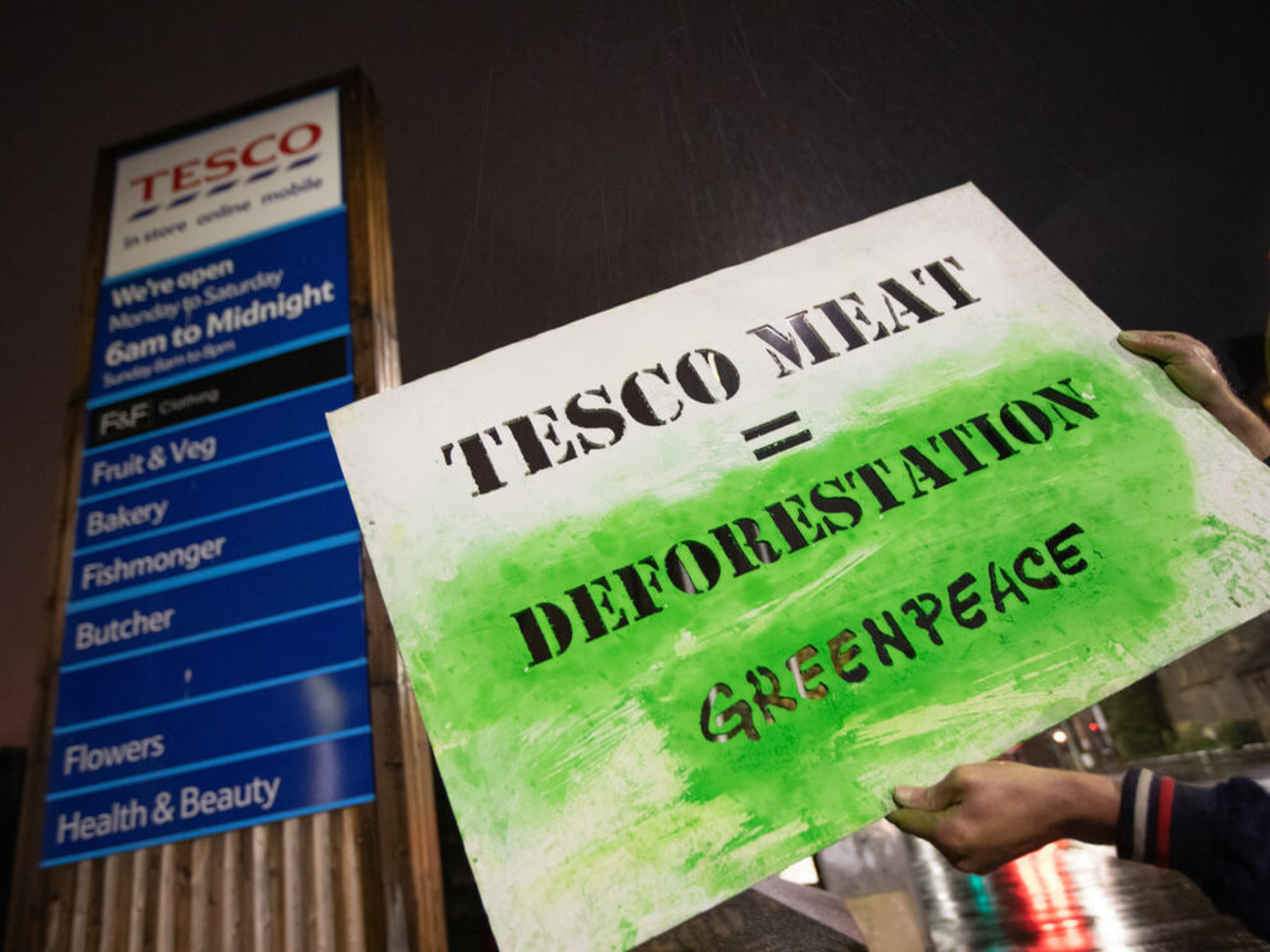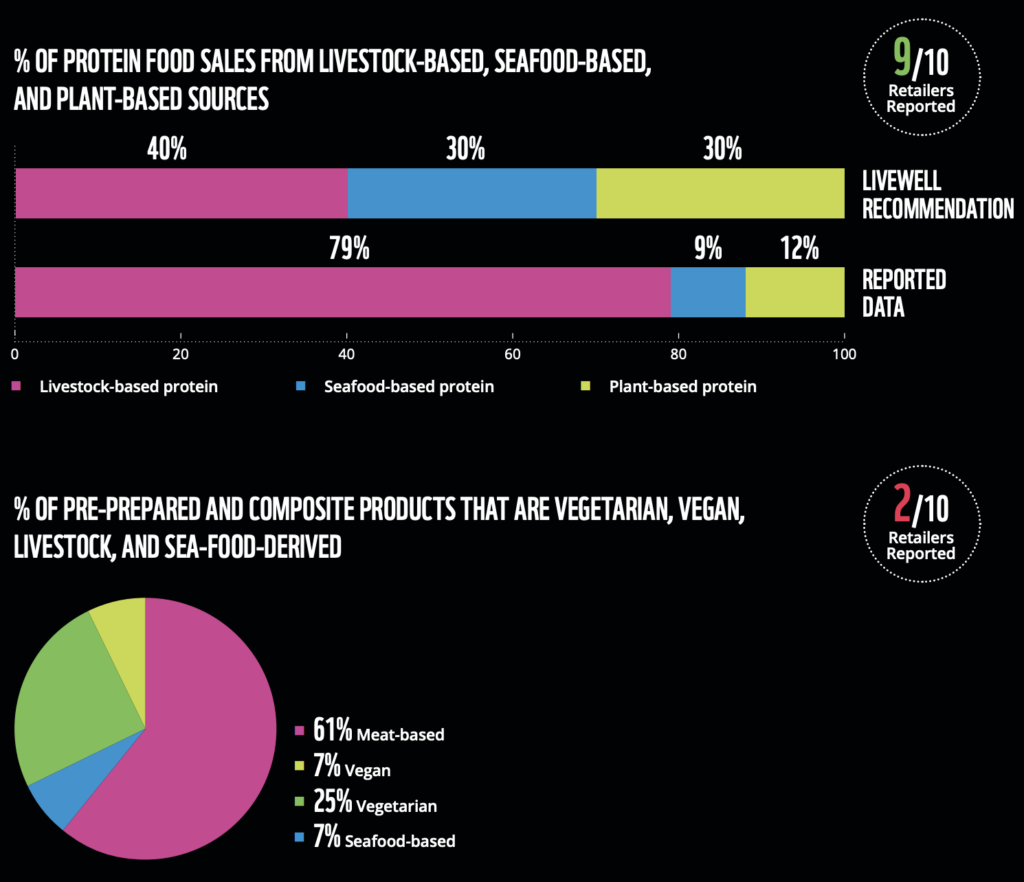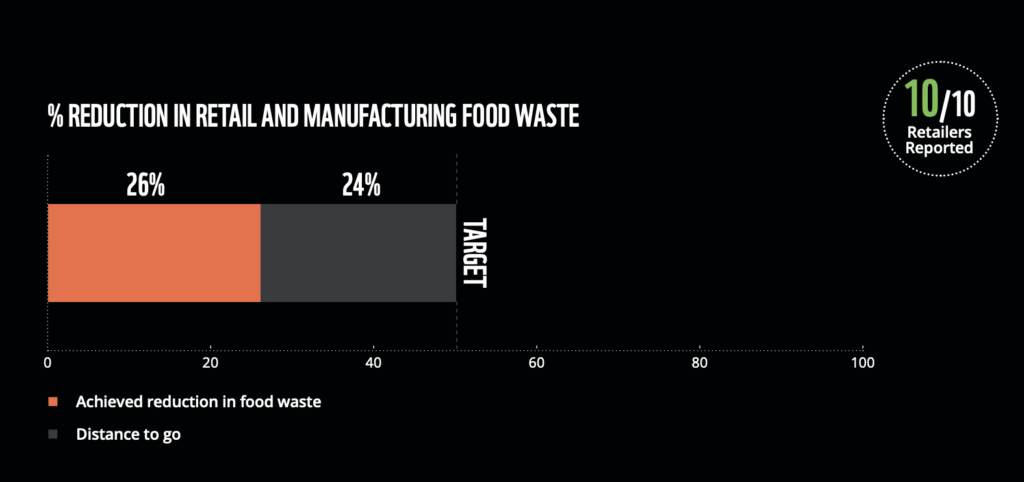
Food waste has increased in British retailers, which are selling twice as much animal protein than needed and off track on the zero-deforestation goal for 2025, according to a new report.
Supermarkets in the UK are lagging behind crucial climate goals for dietary change, food waste, deforestation, and packaging, and their inaction is turning into a “recipe for disaster”, warns the World Wildlife Fund (WWF).
The annual WWF Basket report measures progress towards the goal to halve the climate impact on UK shopping baskets by 2030, a commitment adopted by seven supermarkets, including Tesco, Sainsbury’s, Lidl, Aldi and Waitrose. It found clear areas of concern – alongside gradual progress – across seven progress areas.
It comes just a year before the first milestone of the initiative: to ensure a deforestation-free supply of key commodities like soy, palm, beef and cocoa. Retailers are “way off track” on this target (slated for the end of 2025), with only 4.5% of soy – mainly entering the UK to feed farmed animals – found to be verified deforestation- and conversion-free. That figure is even lower for cocoa, at just 0.3%.
“Consumers should not have to worry about whether their food shop is fuelling the climate crisis or pushing precious wildlife closer to the brink,” said WWF CEO Tanya Steele.
She added: “How we produce food remains one of the biggest threats to our planet. And while it’s positive that UK supermarkets have pledged to source their food responsibly, they must now follow through.”
Failure in deforestation goal will have cascading effects

The third edition of the WWF’s report, titled What’s in Store for the Planet 2024, outlines the need for a “full system transition” across the climate, deforestation, agriculture, marine, diets, food waste, and packaging verticals.
It features data from 10 out of 11 major UK food retailers, although some have no visibility of the farms they’re sourcing from, nor accurate assessments of their impacts. While good progress has been made on certain scope 1 and 2 emissions targets, action on reducing emissions from the entire supply chain (scope 3) is still lacking.
The UK may be a leader in setting scope 3 goals validated by the Science Based Targets initiative, but actual progress has been slow: they’re only 11% of the way towards achieving their forest, land and agriculture (FLAG) scope 3 emissions, while their non-FLAG scope 3 emissions have actually increased.
The deforestation target, meanwhile, is a “critical and urgent” worry. Since the WWF Basket was launched in 2021, the world has lost over 7.9 million hectares of tree cover (an area the size of Austria), driven primarily by the food system. It has led governments to set a target to halt and reverse deforestation by 2030, with bans on certain deforestation-linked commodities coming into place in the EU and the UK.
But over 95% of soy needs to be verified as deforestation-free with just over a year to go under the WWF Basket target, and transparency is a major roadblock: on average, supermarkets have been unable to identify the first importer – companies that bring goods into a country from foreign entities for trade – for 59% of their soy supply.
Similarly, virtually no cocoa entering the UK retail sector is verified to be free of deforestation, with only four retailers able to report their cocoa sourcing by first importer. Moreover, these four were only able to trace an average of 65% of their supply chains, and only one did so for their entire supply chain.
To accelerate progress on the deforestation front, the WWF advocates for greater investment in scalable monitoring and verification for deforestation-free supply chains, farmer incentives to promote production without clearing forests, and effective market-wide regulations to increase transparency.
“Failure in this key area will have cascading effects across broader agriculture, marine, and climate goals. Shifting consumer demand away from meat fed on forest-risk soy will be key to turning the tide of success in these areas,” the report notes.
Protein split and food waste targets key for retailers

Despite certain wins, the WWF found that retailers are “consistently struggling to make progress” on factors for which “systemic change is necessary”. This is highlighted in the dietary change targets. Food production generates a third of all emissions and uses 40% of habitable land – to help the sector decarbonise, WWF-UK developed the Livewell Diet, which could reduce emissions by 36% by 2030.
This diet involves a protein ratio of 40% meat, dairy and eggs, 30% seafood, and 30% plant-based proteins. But livestock-based products currently make up 79% of retail sales. Even among pre-prepared and composite products, only 25% are vegetarian and 7% are vegan.
The protein split has been a major source of debate among retailers in Europe this year, with Lidl and Ahold Delhaize leading the way – but much more needs to be done, as a separate WWF report pointed out in October. “There is a need for a rapid shift in protein food sales away from livestock-based sources and rebalance towards plant-based sources,” the WWF Basket report states.
“We know that without a major shift in UK diets towards plant-based sources of protein, we have no hope of meeting our 2030 climate and nature targets and keeping 1.5°C alive,” it adds. “As critical players in shifting consumer demand, grocery retailers must take immediate collective action to increase the uptake of plant-based proteins.”
“All retailers will have to adapt their business strategies to enable and support healthier, more sustainable food environments and purchases if they are to meet their nature and climate targets,” it adds. “To help enable a level playing field and ensure prioritising healthy, sustainable food sales is less of a commercial risk, retailers should advocate, alongside other organisations, for updated national dietary guidelines.”

Another hot issue in UK retail is food waste, which the sector has pledged to halve by 2030. But progress has plateaued on this front, with six retailers reporting an increase. To turn things around, companies need to boost redistribution efforts, engage with suppliers and farmers for better monitoring, and address food waste and loss at the consumer level.
“Supermarkets have a crucial to play in the sustainability of our food system and therefore the climate, but they are falling short of their climate and nature targets and missing them isn’t just bad for business – it’s a recipe for disaster,” said Dave Lewis, the WWF’s chair of trustees.
“The UK government must now step in and urgently introduce the long-awaited due diligence regulations to prevent further destruction of our forests and natural habitats,” added Steele. “Without them, supermarkets will continue to pay lip service while the planet pays the price for their inaction – putting us all at risk.”
The post UK Supermarkets ‘Way Off Track’ on Zero-Deforestation Food Goal, Warns WWF appeared first on Green Queen.
This post was originally published on Green Queen.